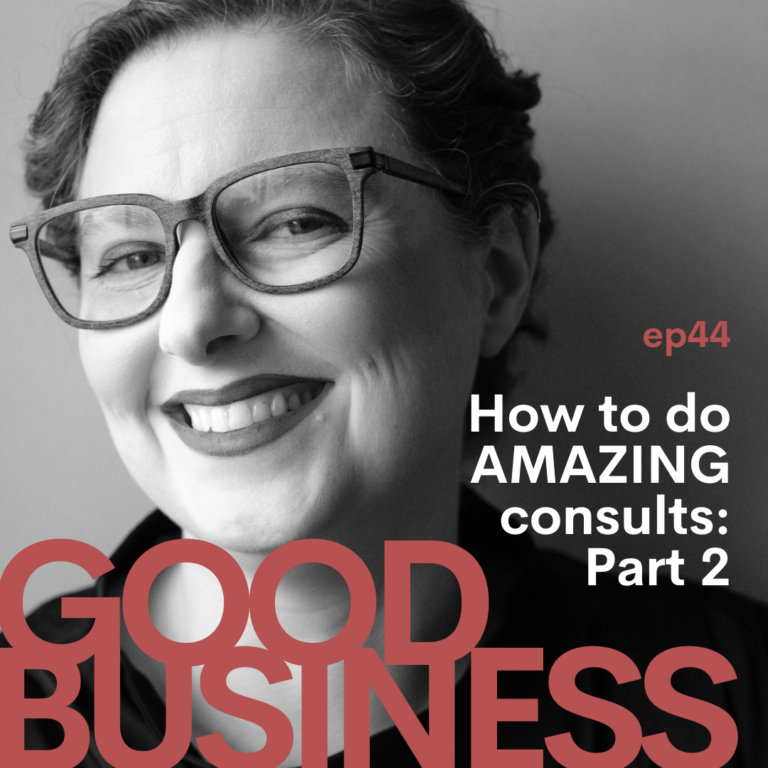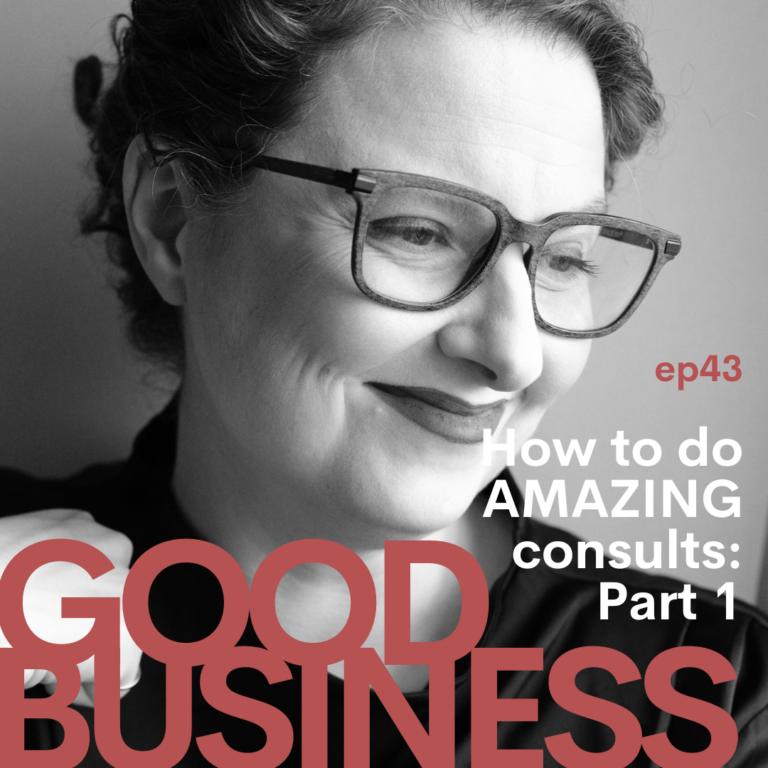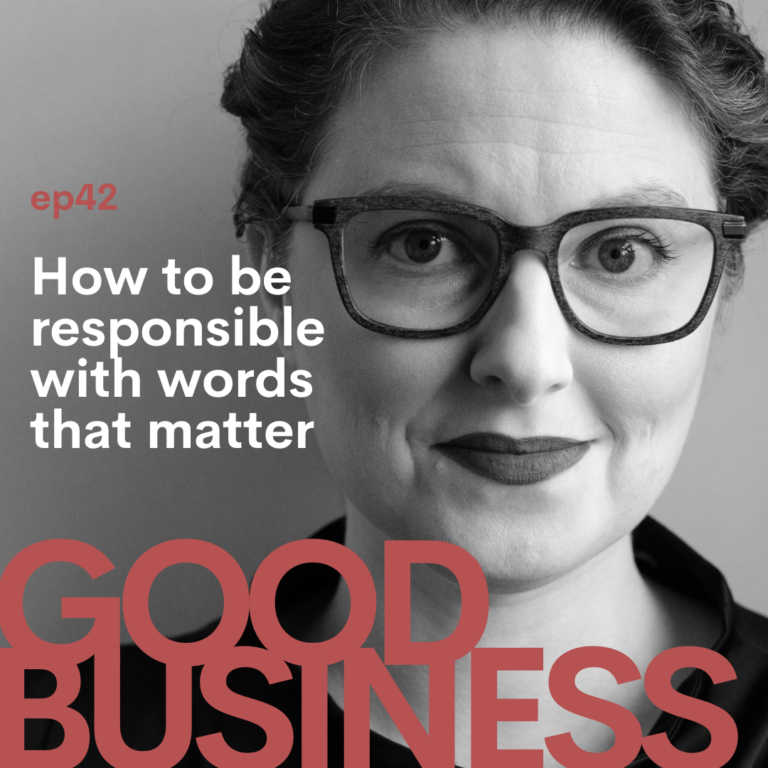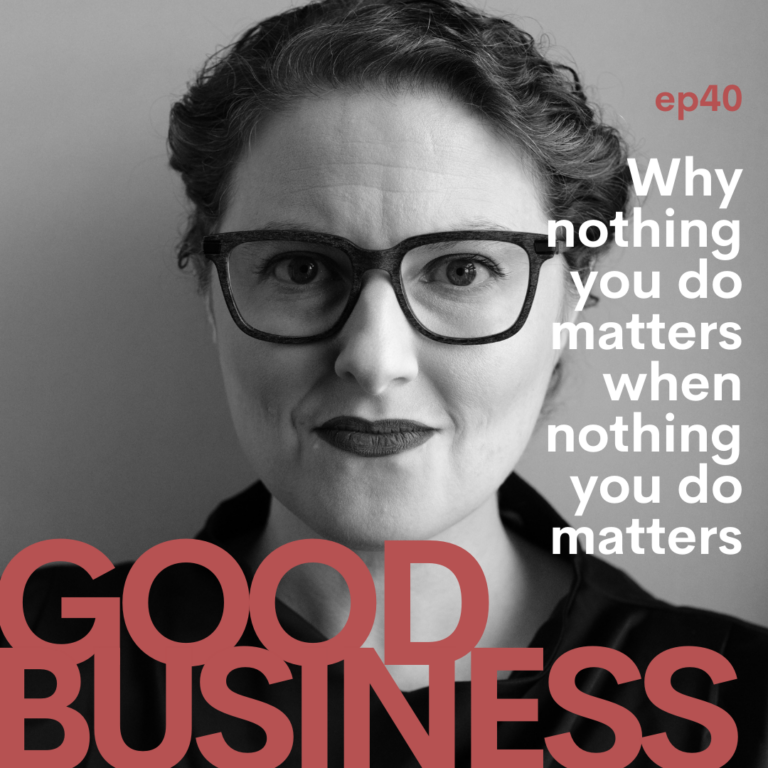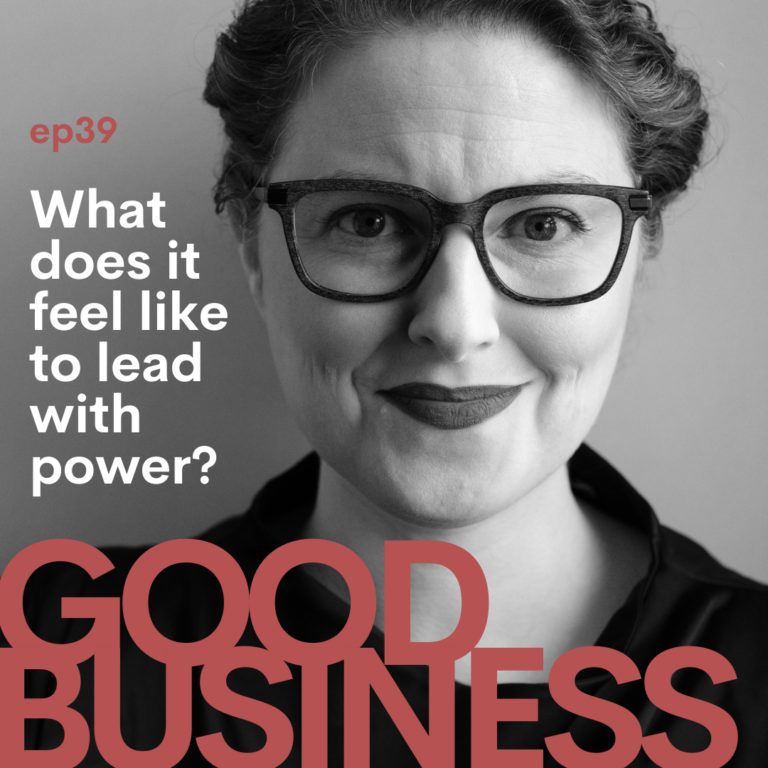Episode Transcript:
I’m Illana Burk, CEO of Your Life’s Workshop, coach to entrepreneurs and solopreneurs across dozens of industries and host of Good Business. With nearly 20 years experience helping hundreds of clients create profitable, ethically driven and sustainable businesses based on their life’s work, I’m here to teach you how to do great work, make great money, and make a positive impact without feeling like you need a shower afterwards.
Hi everybody. Today’s episode is about the clear distinction between starting and running a business, even one that you built around things that you are super passionate about, and finding and creating your life’s work. Two different things, everybody, and that’s what we’re covering today. I want today to be illuminating and inspiring. My biggest hope is by the end of today’s episode, those of you who are trying and trying and trying so hard to figure out why your best efforts don’t feel like they’re in alignment with what you thought your business would feel like and what you thought success would look like, might see a new path forward. That’s the goal. So first I want to cover that. We’re talking about two very separate things, your business and your life’s work. Now we’re going to talk about the ways in which they intersect, but today is all about parsing them out and separating the two so that you understand some of the components of why things don’t connect the way you thought they would.
Sometimes you might get super lucky, and these two things align. I’m one of those people, and I’m going to talk about that in a minute, but the work you’re made of is in alignment with the work that you can make a living at. More often than not, we try to pretend that these things always align. You see tons and tons and tons of marketing people and business people and people who do coaching like me who say, “make a living off of your passions.” That’s great, but not all passions are profitable. That’s the truth. They don’t. Those things don’t always align. They don’t always connect because there’s one clear hard and simple truth; there are very few things people are willing to pay for and good marketing can help people understand how you fit into one of those categories, which we will go over in a moment, but there are fundamental things that you might not be able to make a living on if you’re not in love with your business as much as you are in love with your work.
The fundamental truth is your life’s work might be wildly rewarding and profoundly difference making, but it might not be something people are willing to pay for. That is 100% okay. It really truly is. Say it with me. You do not have to make a living off of your life’s work. You can make a living off of something that you know you enjoy, but you don’t have to make a living off of the thing that you are most made to do. When they were handing out whatever it is that makes your life’s work your life’s work, whatever it is that makes it feel like it’s the work you were made to do when they handed that out on like, soul getting day or whatever, they didn’t attach a commerce piece to that. There’s no rule that says that. You might be somebody who is most happy in life clearing leaves from other people’s yards. I’m sitting here looking at leaves, you guys. That’s where that came from.
Anyway, it might be something that you can’t meet your financial goals with the thing that lights you up the most. Accepting that right up front today is extremely important. Something that I invite you to pay close attention to today. It’s something a lot of people don’t ever confront. They keep banging their head against a wall, going, “why isn’t it working? Why isn’t it working?” Again, one more time. You don’t have to make a living off of your life’s work, but you do need to know if you even can before going in before you get to the banging your head against a wall part. You need to examine and look at whether or not your life’s work can make you a living and, and whether or not you want to do what needs to be done to make that possible.
The first question to ask yourself is, “Do you want to do what you want to do, or do you want to be an entrepreneur or are you willing to do both equally and simultaneously?” Do you want to be a therapist, or do you want to be an entrepreneur? Do you want to be a coach, or do you want to be an entrepreneur? Do you want to be a designer, or do you want to be an entrepreneur? Do you want to save the world, or do you want to be a business owner? They aren’t mutually exclusive unless you make them that way.
You can love both sides equally, but a lot of people don’t. They don’t realize that until it’s way too late. You go to therapy school, and you learn how to be a therapist, and then you immediately come out of school and go, I think I’m going to hang out a shingle. You don’t ever stop to go, “Do I love updating the website on a daily basis? Do I enjoy social media? Do I understand the complexities of copywriting and marketing? Does that feel fun? Does that feel interesting?” Of course not. You go and either pay somebody to do a website, or you throw something up on Squarespace with the attitude that something’s better than nothing and then go, “why or why aren’t all the people coming?” Then you get frustrated by the fact that you can’t do the work you want to do, and around the cycle it goes. You get caught up in the insurance companies and the competition, and all the things that being good at business can help overcome. You get wrapped up in all of that, lamenting that you have to do it right.
Pay attention to that. Notice that, because there are alternatives. You can go to therapy school and then get a job with somebody else being a therapist, and you get to turn it off at the end of your day, and you get not to have to worry about all of those things. Notice there are alternatives, and there are pluses and minuses to everything. If you want to hang out a shingle, if you want to be in business for yourself, you have to genuinely want to be both, or you’ll fail. That’s the truth. If you want your professional passions to happen on your terms, you have to love being both. That means if you want financial success from your life’s work, oh my God, you have to be madly passionate about the making money part too.
I want to sidebar here for a minute. This is a little aside. I want to take a second to talk about why I do what I do. Every piece of content I produce has a secretly selfish motivation. I want the people who are in business to love being in business. It is my core belief that when people love their businesses as much as they love their actual work, the world becomes a better place. Why? I’m sure you’re asking because that probably made no sense. If you truly and deeply care about how you make money, as much as you do about the work itself, you are way, way more likely to add beauty to the world. You’re way more likely to behave with empathy. You are way less likely to take advantage of others in the interest of your bottom line.
That’s the truth. I see it again and again, and I’m one of the fortunate few. My life’s work is to help people do business better while making their dreams a reality. I get to do something where I make a living doing something people know they need to pay for. They’re willing to pay for it. They know they need to pay for it, they know they need education. It also happens to be my life’s work. Okay, sidebar over.
There are only a few things that people are truly willing to pay for it. I’m going to run down those few things. Now, of course, there are permutations of all of these. These are the basics. These are the bullet points. Number one is to make personal changes that will improve their lives quickly and dramatically. Under that are things of convenience, or having distasteful things done for you. Think food delivery, housecleaning, a quick five-minute meditation. If you are coming from a place where you know you need what that person offers, you’re going to be willing to shell out a certain amount of money as long as it’s going to make personal changes in your life that will improve your life quickly and dramatically. Those are key. Even if it’s a perceived quick and dramatic change, it might mean having dinner delivered that improves your life quickly and dramatically, where you’re going to pay a fee that’s probably higher than the tip you would have paid if you would have gotten off your ass and gone to a restaurant. Notice that.
That’s one area. The second is things that make you feel better about yourself. That’s where clothes, cars, and objects. Better is a subjective term there because everybody has an idea of what better is. That’s where jeans that make you look skinny, or cars that make you look like you’re going to get laid, or objects that make you feel richer than you are or change people’s perception of you. Those all fall into that category. Sometimes things could make you feel better about yourself, can be something that’s extremely utilitarian. I’ve been on a hunt for the perfect handbag for my entire adult life. For me, it’s not designer stuff. It’s not visual. It’s a tactical thing and has to have the right pockets in the right places. It’s the white whale. I finally had one made on Etsy. I highly recommend that by the way. I finally had somebody make what I had in my head, and I was absolutely willing to pay like triple what it was, probably because I got to design it myself.
The next thing on the list is absolute necessities. We’re willing to pay for the absolute necessities and what we perceive as a necessity is also different for a lot of people. Some people might think to have an extremely comfortable, high-end luxury, and safety riddled ride like a BMW might feel like a necessity, whereas someone else might be like, “I need a skateboard to get to work. That is a necessity.” Our measures for these things are different. Understanding the underlying motivation of your product, if it falls into that category, is the key part.
Number four are experiences that have an improved status attached to them. I’m being really honest, this is hard. Think experiences, think vacation. You’re going to go and travel for the experience’s sake, but you’re going to share it on Facebook because you want everyone to know you do cool things with your life. Things that can improve status in some way, even if it’s among your family and friends and peers, people are willing to pay for if it’s going to make them seem better than they were yesterday in some way. I know that sounds icky, but it’s not. We are ego driven, selfish creatures. We just are. That is who we are. We spend our lives pretending we’re not. Buying decisions are made from a completely ego-driven place. You have to confront that and notice it and understand it before you can accurately sell anything to anyone. Accept that. Know it to be true.
The fifth thing is access. If you have connections, if you have status, people will pay to leverage that. They will do anything to open doors that they couldn’t open themselves.
Those are the five things. Those are the basics. In pretty much anything you can throw at me, I could stick into one of those categories. We are simple creatures, you guys, we want to feel better about ourselves. We want our life to feel easier. We want things to be more convenient, and we are willing to violate our ethics and values in pursuit of those five things.
That’s an important thing to notice as a con on the consumer side of things. Here’s where I confess. Confession time here. I freaking hate Amazon. I hate it. I think Jeff Bezos is the fucking devil. I think he’s an awful human being who is destroying small businesses, and destroying commerce and taking advantage of people left and right. I live in a tiny house where we travel all the time, and we rarely know where to buy things. When we get to a new place and getting something delivered via Prime is easier. Sometimes I have to choose ease over my values, and that sucks for somebody like me who proselytizes on values and ethics constantly. I see the irony, you guys. I fucking hate it. I hate it. It’s something I hate about myself, but I’m going to do it anyway because we’re all doing the best we can.
We all fail at these things, but we know this is the truth. I’m telling you this to reinforce my point that people will break their vows with themselves for convenience. They will break their valves with themselves for something that improves their stature. They will break their budget for something that makes them feel better about themselves. Those are where real, true buying decisions happen. So get that. Notice it, accept it, it’s just the truth.
Let’s get back to you. Is your work something people are willing to pay for? Are you in love with the prospect of making a business out of that as you are with the work itself? Do you love it? Do you love both sides of it? You have to answer yes if you have any hope of being financially successful. I’m going to say that slower because it’s important to notice all the words you have to answer. Yes. If you have any hope of being financially successful, you can be extremely successful at things and have them not have a financial gain. Understanding what your measure of success is, is key.
I’m only talking about the money end. If you want to make a living off of being a therapist or an acupuncturist or a marketer, whatever your thing is that lights you up, you have to love the business side. You have to love selling, which is what business is. It’s selling. It’s all selling. If you’re confused about selling and you want to know how to sell without feeling gross, go back to our three-part selling series. I’m sure you’ll find them in the archives. Listen to those episodes because they’re super good and they’ll make you not feel yucky about selling. Even if you sell something that people want to buy, that doesn’t mean you’ll be successful automatically. You have to get that. A successful business is made up of both halves, half the work you love and half a business you love.
If you’re sitting there thinking, “shit, I don’t want to be a business owner, but I am one.” If you’re like, “fuck, I have a website. I hung out a shingle, and I fucking hate every piece of what it takes to be a business owner.” That’s probably why. If you don’t even know how to log into your website because you ignore it and hope people will come to you. Or think, “I don’t want to pay for advertising, or I don’t want to pay a copywriter to help me do something that I don’t know how to do and write better copy and do better marketing. I don’t want to do any of that.” Then I’m really sorry. I’m really sorry if that’s you right now. I bet there are a lot of you. I talk to clients all the time that are in that boat. Don’t freak out yet. Try to deal with the deflation and the welling up tears that are happening right now, but don’t freak out. If you have a visceral aversion to commerce and selling and marketing and all of it, you might have a bias or understanding problem.
Part of my job is to show you how much there is to love about owning a business. It’s such a loaded concept, owning a business, or being in business or being an entrepreneur. We all close our eyes, and we see the assholes on Shark Tank, and we see the dumb shits that are standing there in front of them. We all have these pictures of what business means. Maybe we had a parent who was a shark of a business owner. Maybe we see people on TV or whatever it is. We have these associational connections to like what we think business ownership is, what financial success is, what we think all of these things are. Until you can unpack those biases and notice whether they’re legitimate biases or actual legitimate loving, you have to understand everything it takes to be in business before you can make an accurate judgment.
I invite you to do that. You probably never have. I keep using this example because it happens to have come up a couple of times recently, and I have several healers client base right now. If you’re somebody who’s in the healing arts, If you want to be a healer, or, let’s use an acupuncturist. I was having a conversation with a client who’s an acupuncturist recently. This is something she was going through, where they don’t teach you this at acupuncture school any more than they teach it at coaching school, or design school, or copywriting school, or any of the places where people learn things that people go into as Solopreneurs whether they’re brick and mortar or online.” They don’t teach you about business.
They teach you maybe one little unit on marketing, but they don’t express what it takes to be in business for yourself in that modality, whatever it is. Like. I think it’s such a huge mistake. All those vocational schools out there, if you want to hire me for a workshop, let me know. I keep hearing that over and over again. It’s like, “oh, you should teach at these places. They need to hear this.” It’s true. Why don’t they? Why don’t they say, “hey, you want to be a therapist? Well, guess what, you’re going to spend roughly 20 hours a week marketing yourself. Are you up for that? Or maybe you should get a job at an institution someplace. If you don’t want to do that if you’re not up for that.”
Part of my job is to help you learn how to love business. I want you to love it. There’s so much to love. It can be so fun. There are so many challenges in layers and interest and risk and enthusiasm and connections, and there are so many cool things to love about being a business owner. I want to invite you to do that. That’s a huge reason why this podcast exists. I want you to see the ways in which you can do things on your terms and love them and have it not be so hard all the time.
If you learn how to love the business side and you offer something people are willing to pay for, you might have a chance at making a living doing what you love, but you’ve got to find all those layers. You have to make peace with them and find them all in alignment together. That requires help. That requires education because thinking about how much education you got to do whatever the thing is. Think about how long it took you to learn that, and then you’re going to throw out a shingle and go, “Now I’m a business owner,” but you’re not going to do any of the learning. Fuck that. I went to school for business. I learned this stuff. It’s hard. It’s complicated. My brain is packed so full of information that I hardly ever use sometimes, there’s a lot of layers and permutations to understanding business, and critical thinking is core to all of it. If you haven’t learned how to do all that, you’re creating a situation where, of course, you’re going to hate it because you see other people who make it look easy because they learned it.
You can learn it. That’s why I’m here. That’s why people like me exist so that we can teach you. Let us. On our next episode, we’re going to start that process in a whole new way. We’re going to dig into all the things there is to love about business. It’s going to be a super fun bullet point list, and I’m not talking like freedom and all that. There’s the surface stuff that we all know. I’m talking about how to love all the things that you think you hate. So join me, won’t you, and thank you for joining me today.
Thanks so much for hanging out with me today. For more information, visit www.thegoodbusiness.co or www.lifesworksdev.wpengine.com.
More Episodes
How to do AMAZING consults – Part 2 | GB44
This episode is the second in a series on how to do amazing consults and why it matters. The answer is not just "because it's how you get money." We're using consults as a basic template. But the structural process that I'm...
How to do AMAZING consults – Part 1 | GB43
This episode is the first in a series on how to do amazing consults and why it matters. The answer is not just "because it's how you get money." We're using consults as a basic template. But the structural process that I'm going...
How to be responsible with words that matter | GB42
In this episode, we are talking about language and leadership. This is one of my favorite topics because we are going to talk about the words that need to fucking go.
But IS IT a revolution? Really? | GB41
In this episode, we talk about what productive antithetical marketing can look like, what it isn't, and what any of this has to do with toilet paper. Episode Transcript: Hi everybody, and welcome back to the Good Business...
Why nothing you do matters when nothing you do matters | GB40
In this episode, we're talking about impact. Do you feel like nothing you're doing matters? What if it doesn't? Without power, nothing you do matters. Episode Transcript: And welcome back to our ongoing leadership series. I’m...
What does it feel like to lead with power? | GB39
This episode is all about what it feels like to lead with power. This might seem like a bit of a misnomer. Obviously, if you're going to lead, then you have to have power, right? Well, it's not actually true. This week, I talk...

